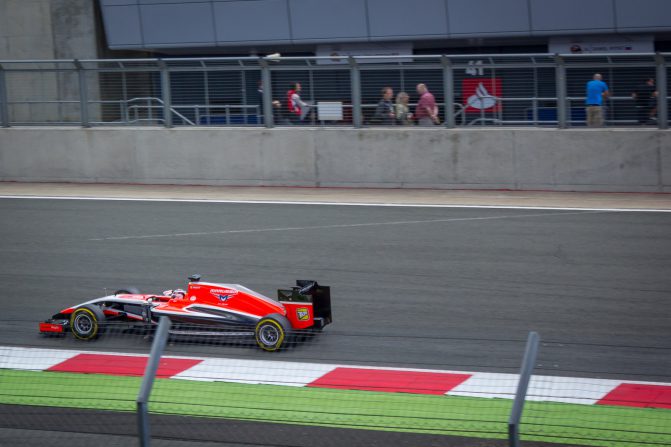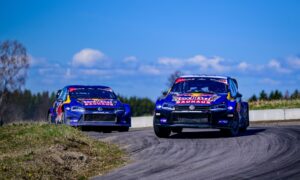F1 can often seem achingly predictable. Particularly lately with imperious Mercedes, and particularly at a track such as this one in Barcelona. Long seen as the sport’s bellwether; long seen as the last place to expect drama. Long seen too, as where Mercedes would run and hide.
But despite everything F1 is not like a lot of other sports when it comes to how confidently we can call results. Things can happen to end your chances there and then. Also those things can have nothing to do with the opponent that ends up winning out. More than one of these things came together to give us a highly unlikely result in the Spanish Grand Prix. It’ll be one surely to go down in folklore.
The Mercedes Account for Each Other
That thing we’d long suspected and perhaps even speculated about, but somehow couldn’t quite comprehend in reality, happened. The two Mercedes took each other out, and a mere handful of corners into the race.
Inevitably the recrimination was quick, but in reality it looked just one of those things. Nico Rosberg led after a fine move around the outside of his team mate Lewis Hamilton at turn one. Lewis retaliated before turn four, aiming his car for the inside. Nico blocked, but by the time he’d got there Lewis was already alongside. He was forced off track and, out of control, collected his team mate too. Yet the real culprit appeared to be a sheer speed differential between the two cars, which had a peculiar explanation. It later was revealed that Nico was in the wrong engine mode and Lewis therefore was closing at some 17 kph faster. This it seems explained Nico’s surprise at Lewis’s swift appearance at his side.
A Strategic Battle
Even then we shouldn’t have got the unlikely victor that we did. Daniel Ricciardo and Sebastian Vettel should have slugged it out for the win, but they boxed each other into a corner. Either it seemed covering the other, they committed themselves to three-stop strategies rather than two, which while sound enough on paper left them with overtaking to do, which at this circuit is largely theoretical only. Ferrari in particular may, like Merc, have its own inquest into how this one got away.
No, this race was one for the other guy, with the ‘fall back’ strategy given to the ‘second’ Red Bull and Ferrari in fact turning out to be the better one, to the clear surprise of both squads. Max Verstappen and Kimi Raikkonen stopped just twice, almost it seemed by accident but it worked a treat for them.
It meant a hot race boiled down to whether Max could withstand the pressure from the pursuing Kimi… Of course he could. Even though he remains but 18 years old; even though it’s his first drive for the Red Bull A team, after all of the controversy about his switch around with Daniil Kvyat. He didn’t put a wheel out of line or let Kimi get near. Just as with every challenge that he’s faced in his F1 career he beat it as if born to it. If Verstappen’s first F1 victory wasn’t expected this soon, that it happened at all was far from unexpected.




